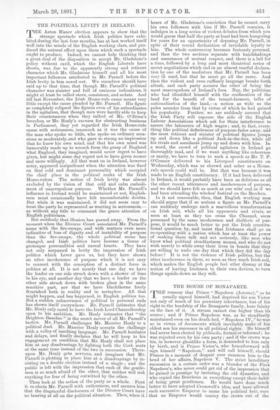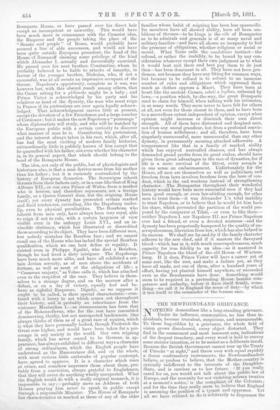THE HOUSE OF BONAPARTE.
THE rumour that Prince " Napoleon (Jerome)," as he usually signed himself, had deprived his son Victor not only of much of his pecuniary inheritance, but of his right to the headship of the Bonaparte family, bore falsity on the face of it. A stream cannot rise higher than its source ; and if Prince Napoleon was, as he steadfastly maintained even on his death-bed, '‘ Napoleon IV.," he was so in virtue of documents which inevitably make of his eldest son his successor in all political rights. He himself had never been elected by plebiscite, formal or informal ; he was rejected even by his own party ; and if the crown was his, in however ghostlike a form, it descended to him only by birth, and is Prince Victor's, who henceforward will sign himself " Napoleon," and will call himself, should France in a moment of despair ever summon him to the head of her affairs, Napoleon V. The strict hereditary succession in a certain order was a blunder of the First Napoleon's, who never could get rid of the impression that he gained in prestige by imitating the old dynasties, and who copied the Bourbons in everything except their habit of being great gentlemen. He would have done much better to have adopted Cromwell's idea, and have allowed each successive Emperor to name his political heir, sure that no Emperor would convey the crown out of the Bonaparte House, or have passed over his direct heir except as incompetent or unworthy. This would. have been much more in consonance with the Cresarist idea, the Emperor and the people taking the place of the " Senate and people " of Rome, would probably have secured a line of able successors, and would not have been quite outside Euroveau precedent, the head of the House of Romanoff claiming some privilege of the kind which Alexander I. actually and successfully exercised. He passed over his next brother, Constantine, whom he probably believed to be liable to attacks of insanity, in favour of the younger brother, Nicholas, who, if not a successful, was at all events an impressive occupant of the throne. Napoleon's opportunity, complete as it was, was however lost, with this absurd result among others, that the Cresar asking for a plObiscite might be a baby ; and Prince Victor is acknowledged by his party and his relatives as head of the dynasty, the man who must reign in France if its pretensions are ever again legally acknow- ledged. That acknowledgment carries little at present, except the devotion of a few Frenchmen and a large number of Corsicans ; but it makes the new Napoleon a " personage " whom diplomatists will study, and who will be watched by the European public with a certain curiosity to discover what manner of man he is. Considering his pretensions, and the interest always taken in his race, which, after all, has had the most exciting of modern family histories, extraordinarily little is publicly known of him except that he quarrelled with his father, not even whether his character is, in its general aspect, that which should belong to the head of the Bonaparte House.
The idea, not only of the public, but of physiologists and historians also, is that a man derives more from his mother than his father ; but it is curiously contradicted by the history of European dynasties. The Sovereigns inherit thrones from their fathers only, or in a case like that of King Alfonso XII., or our own Prince of Wales, from a mother who is heiress, and therefore represents, not a foreign family, as a Queen Consort does, but the reigning House itself ; yet every dynasty has presented certain marked and fixed tendencies, extending, like the Hapsburg under- lip, even to physical peculiarities. The Bourbons, who inherit from men only, have always been very royal, able to reign if not to rule, with a certain largeness of view visible even in the unhappy Louis XVI., and an in- vincible obstinacy, which has illustrated or discredited them according to its object. They have been different men, but nobody mistakes the Bourbon face ; and we cannot recall one of the House who has lacked the special Bourbon qualification, which we can best define as regality. It existed even in Philippe galit6, who died a Bourbon, though he had lived a dirty intriguer. The Hapsburgs have been much more alike, and have all exhibited a cer- tain Jovian serenity, as of men above the accidents of fortune, as well as most of the obligations of life ; a "Caesarean majesty," as Vehse calls it, which has attached even to the stupidest of the race. They believe in them- selves to a strange degree, and on the morrow after a defeat, or on a day of victory, equally feel and be- have as rightful Emperors. Dignity, as we suppose it ought to be called, is their special characteristic—com- bined with a hurry to act which comes out throughout their history, and is probably an inheritance from the visionary Maximilian I.—as strenuousness has been that of the Hohenzollerns, who for the rest have resembled domineering, thrifty, but not unrespected landowners. One always thinks of them as of a great race of squires, which is what they have personally looked, though Frederick the Great rose higher, and would have been taken for a per- sonage in any society in the world. Our own reigning family, which has never ceased to be German in ap- pearance, has always exhibited in different ways a character of strong ordinariness, which the English people have understood as the Hauoverians did, and on the whole, with most curious little outbreaks of popular contempt, have agreed to approve. It is a character which rises at crises, and somehow impresses those about them, pro- bably from a conviction, always grateful to Englishmen, that they will never do anything wholly unexpected. What the English would do with a really original monarch, it is impossible to say ;—probably move an Address of both Houses praying him never to speak in public except through a responsible Minister. The House of Bonaparte has characteristics as marked as those of any of the older families whose habit of reigning has been less spasmodic. Its members have all showed ability, have all been am- bitious of thrones—to be kings is the role of Bonapartes as to be admirals and generals is of so many naval and military families—and have all shown an incapacity to feel the pressure of obligations, whether religious or social or moral.. What Taine calls the condottiere instinct—the refusal, or rather the inability, to be bound by any con- sideration whatever except their own judgment as to what it would best suit them and best pay them to do just then—has been dominant in all. They have not been gen- tlemen, not because they have any liking for common ways, but because to be refined. is to submit to an immense number of rules and obligations which oppressed them much as clothes oppress a Maori. They have been at heart like the ancient Crews, soluti a legibus, unbound. by laws,—a position which, by-the-way, the great Bonaparte used to claim for himself, when talking with his intimates, in so many words. They seem never to have felt for others at all, not even for those closest to them, and to have been to a marvellous extent independent of opinion, except when opinion might increase or diminish their own direct strength. All of them have distrusted and despised men, not from any moral grandeur, but from a profound convic- tion of human selfishness ; and all, therefore, have been singularly unsuccessful, more unsuccessful than any other dynasty, in permanently securing attached adherents. A temperament like that in a family of marked., ability which has enjoyed unrivalled chances, and has always demanded. grand profits from its great stakes, should have given them great advantages in the race of dynasties, for if life is a mere survival of the fittest, every scruple is in one sense an embarrassment. -Unfortunately for the House, all men are themselves as well as politicians, and freedom from laws involves freedom from the laws of con- duct, which in the end weakens instead of strengthening character. The Bonapartes throughout their wonderful history would have been more successful men if they had been good enough, or even law-abiding enough, for other men to trust them—it was Alexander L's total inability to trust Napoleon, or to believe that he would let him have his share, which prevented. the partition of the world pro- posed by the conqueror at Tilsit,—or even to like them— neither Napoleon I. nor Napoleon III. nor Prince Napoleon ever had a friend, or even a devoted mistress—and. the dynasty has been perpetually hampered by the quality of un- scrupulousness, liberation from law, which has also helped in its success. We shall see by-and-by if the family character adheres to the new chief, and if it masters the Savoyard blood—which has in it, with much unscrupulousness, much capacity for iron fidelity to an idea—as it mastered in Prince Napoleon the blood of the old House of Wurtem- burg. If it does, Prince Victor will have a career yet of some sort, like the rest, and make a failure yet, as they have all made, not one of them, after a hundred years of effort, having yet planted himself anywhere, or succeeded even as the Beauharnais have done. Something would. seem to be required. in a pretending House besides com- petence and audacity, before it fixes itself firmly, some- thing—we call it in England the sense of duty—by which it ties itself to the remainder of the human race.



































 Previous page
Previous page